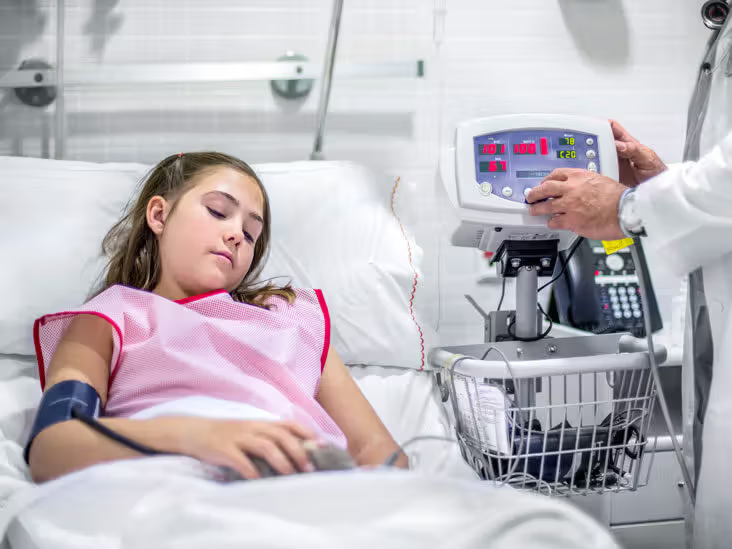
Following Dr. Green’s advice; I had been to the ER multiple times in the three-month gap between my second and third appointments. She had instructed us to go there every time the top number (systolic) of my blood pressure went over 200, or my bottom number (diastolic) went over 110. The thing was every time I was at the ER they would order blood work and my low potassium would force them to admit me to the hospital at least overnight to get me replenished.
Because my low potassium would be critically low and because it wouldn’t respond to oral potassium, they would usually have to admit me. I would either go to the ICU, critical care step-down unit, or a telemetry unit. That’s because potassium affects the heart and can be deadly if not immediately treated. It can cause fatal heart rhythms. A couple of times endangering my heart. Low potassium can be very serious if not properly addressed. It can cause fatal arrhythmias. A couple of times they caught me going into v-tach . I would feel like there were butterflies in my throat trying to rise up and the heart monitor would start going off like crazy. Then there would be the sounds of running footsteps and people racing into my room pulling a crash cart behind them.

I struggled with low blood pressure my whole life. It wouldn’t have been so bad, but I also struggled with tachycardia (too rapid heart rate) my whole life as well. The two issues combined were a recipe for hypovolemic shock. When I went into hypovolemic shock, we called it bottoming out. It was one of the reasons I was admitted to the hospital so frequently.
“Any time you know you’re bottoming out, that’s an automatic 911 call”. Dr Oster had told me.
I could always tell when I had low blood pressure and a high heart rate and was going into shock. My skin would turn bluish-gray and I would alternate between having chills and hot flashes. The world would start trying to pin me down. Exhaustion would overwhelm me along with a pull towards the darkness of the unconscious.
No matter where I was when the low blood pressure hit, I would have to call for an ambulance. If I was at home it wasn’t the biggest deal in the world, but if I was in an embarrassing place it was awful. Pretty much anywhere in public fell under the category of an embarrassing place. The more people around, the more embarrassing it was. Sometimes I would need to call an ambulance from art class. Other times I would be at the mall or the park with friends.

“You can’t purge in the dining room like that!” the counselors and nurses would tell me. “Do you know how triggering that is for the other girls?”
At first, I didn’t even know what purging was, but in therapy groups, I learned it was forcing yourself to vomit to get rid of food you just ate so that you didn’t gain weight, or to lose weight. Then I got really confused about why the counselors and nurses said I was “purging” when I threw up, because I obviously wasn’t doing it on purpose, and I would do anything to gain weight, my body just wouldn’t cooperate.
The anxiety the meals and snacks on the eating disorder unit caused was obvious to everyone.
Dr. Hizami, my psychiatrist on the regular psychiatric unit decided I must have an anxiety disorder and put me on a medication called Klonopin, a benzodiazepine (powerful anti-anxiety/sedative medication.
I completely lost it. Now I was officially a psychiatric patient. It was like someone flipped the crazy switch on me and I turned into a ball of self-destructive energy, smashing my head against walls, biting my arms till they bled, and pulling out fistfuls of my own hair.

Hearing the doctor confirm that it wasn’t all in my head brought me so much relief. But the relief didn’t last. After getting admitted to the pediatric medical/surgical floor I went through a battery of testing. Nothing else showed up as a problem and because my parents and home care team continued to insist that I was just a psych case, the hospital finally decided that maybe there really was nothing physically wrong with me.
The final decision was that I was anorexic and would need to be transferred to the psych unit for children in a different hospital, where I would be on a unit for 5 to 11-year-olds but have meals and some groups with the eating disorder unit.
At that point I had a special feeding tube in my nose called an NG tube. It went from my nose down my throat, past my esophagus, and ended in my stomach. The part of the tube that came out of my nose was hooked up to tubing that was connected to a bag of a liquid called tube feed that contained all the nutrition I would need in a day. It ran on a pump that set the rate of how fast the tube feed ran in. Until I could start eating enough calories a day to maintain my weight, I would need to have that NG tube.

My dad’s arms were wrapped firmly around me as he held me while talking to the lady at the desk at the entrance to the pediatric emergency room. About twenty minutes earlier I had passed out in an elevator on the way out of Dr. Monroe’s office. The vampire lady in her lab had just sucked out her usual four tubes of blood from the crook of my arm. When she was done she gave me a unicorn sticker, and I stepped into the elevator. The next thing I remembered being aware of was my dad leaning over me yelling my name in a panic. He had picked me up in his arms like a baby, not the ten-year-old girl I was, and carried me out to the car. I didn’t fully wake up until we were racing down the turnpike toward the hospital.

Jonathan (my 5-year-old brother) was struggling in kindergarten.
“I think he might be on the autism spectrum,” I heard his teacher say to my mom when we went to his classroom to pick him up. The school kicked me out after I got dizzy in class too many times. When they sent me to the nurse’s office for it, my blood pressure would be so low that they would have to call my mom to bring me home and make an emergency doctor’s appointment with Dr. Monroe
.
They decided that I couldn’t go back to school until I was eating three meals a day and had a doctor’s note clearing me to return.
That day the teacher pulled my mom aside, my mom sounded angry.
“He is not, autistic” my mom glared at Jonathan’s teacher.
“He needs testing done if he ever wants to graduate kindergarten. At the very least he has severe learning disabilities.” The teacher told my mom, as Jonathan stared intently at a skid mark on the linoleum floor.
It was another whole year before Jonathan got the testing done. He had to repeat kindergarten. But again, Jonathan wasn’t in immediate danger of dying, so my issues were the ones put front and center, and all my parent’s energy was thrown into playing food police on me.

Everything started at age eight when I stopped being able to eat lunch at school. If you ask a thousand different people with gastroparesis, “What do you do when your stomach fails you?” They will give you a thousand different answers. When I was in third grade my answer was to refuse to eat lunch and snacks anymore.
Of course, this made my parents very anxious, and started them asking me a bazillion questions. I almost wanted to ask them, “What would you do when your stomach fails you?” but I knew I couldn’t talk to my parents like that.
It wasn’t until the end of third grade and the summer of my nine-year-old check-up that my parents really went on high alert. But as soon as I saw Dr. Monroe, my pediatrician, she noticed I had fallen off the growth charts for weight and then was reminded that even though I had barely turned nine I was on the highly competitive level six gymnastics team. Instead of thinking, “What do you do when your stomach fails you?” She decided to plaster me with the eating disorder label and dismiss all possible physical possibilities for my stomach failing me.

I can trace my descent into chronic illness all the way back to age eight. Up until then, I was actually a healthy kid. Until then there was no mention of hospitals, tube feeding, IV nutrition, terminal illness, or unrelenting pain. None of that. Back then there was no talk about me having an eating disorder.
The first sign of any issues occurred in third grade when I began suffering from frequent pounding headaches.
Another early sign of something amiss was how dry my body was. If I went a couple of hours without sipping on a drink I could put a finger in my mouth and move it around, and my entire mouth would be bone dry.
My skin began to get very dry as well, and I noticed something odd, I no longer could sweat, no matter how hot the temperature was.
Even my eyes were super dry to the point where it made my vision blurry.

My current nursing care team was only made up of two people. Laurie, my PCA, and Jackie, my nurse. However, about a week earlier, my nurse Jackie had dropped the bucket of bad news over my head. She was going back to school to become a nurse practitioner. After posting a whole lot of Facebook ads and interviewing three to four nurses, I made contact with Melody. As I tried to describe the nursing care I required in medical terms, Jeff butted in. He gave her the rundown on what I was like and how my care worked. Jeff described me as some sort of high-tech, inflatable Barbie doll toy. He explained that I needed to be hooked up to charge overnight.
Melody grinned at me, “I’m up for a challenge! I’d like to do more than just provide nursing care and keep you alive. I’d like to see you thrive. If you decide to hire me, we can do lots of awesome stuff together. We can drive down to see your parents and grandparents. Other times we can go to the park with Jeff to race remote control cars. Or we can go to the mall to shop at The Children’s Place or Justice. Sometimes we can even do art projects together. I would really love if you could share some of your writing with me!

My love for Jeff went beyond any love I had ever felt before. I just wasn’t aware of it. What I was aware of was the fact that goodbyes are one of the hardest things in the world, and I never wanted to have to say my goodbyes to Jeff.
All of Jeff’s doctors assured us that he was at the top of the liver transplant list. They kept telling us that he and his mom could get a call any day to drop everything and rush down to Umass Memorial Medical Center to be prepped for the most major, most life-changing surgery of his life. A surgery that could take his life span of months to a couple of years at the most, and add a lifetime onto it.We were in a race against time. There was a strong possibility that his liver cancer had returned. We were waiting on an appointment with a GI doctor, Dr. Xander to go over his scans. The even more frightening reality was that if his cancer actually had returned he would be immediately removed from the cancer list. I might have to say my goodbyes to him. I usually tried to put all thoughts of his mortality out of my head and just enjoy him, in the moment.











